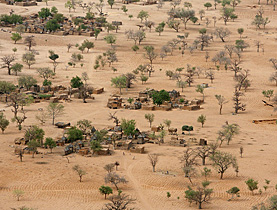Walking the tightrope of climate policy

World politicians meet every few years with plenty of razzmatazz to thrash out deals to prevent global warming and tackle its consequences.
But behind the scenes, the negotiators depend on painstaking research carried out by specialists in a range of fields, such as those brought together by Switzerland’s National Centre of Competence in Research on Climate (NCCR Climate), based at Bern University.
The university is hosting a three-day conference starting on Wednesday where experts from all over the world will be discussing the international aspects of tackling climate change.
Philippe Thalmann, professor of economics at the Federal Institute of Technology in Lausanne, told swissinfo that most of the participants will be social scientists and in particular economists and specialists in trade law.
The impact of climate change will be felt internationally, but nevertheless different countries have their own national interests when it comes to facing up to the challenge. And domestic climate policies have an international aspect which cannot be ignored, as Thalmann explained.
“For example, businesses will say: ‘If you impose a tax on carbon emissions, we shall lose our international competitiveness’ or ‘We will relocate to other countries’.”
Governments are then faced with opposing pressures. On the one hand they want to impose climate constraints, and on the other they want to protect their industries.
One solution is to impose what are called border tax adjustments, which means imposing the same climate tax on imports that they would have had to pay if they had been produced domestically.
“But everything you do that affects competition between domestic and foreign producers is of interest to the World Trade Organization because it could be a sort of hidden protection of domestic industry,” Thalmann said.
Rich vs poor
One of the things the conference will be looking at is ways to reconcile the interests of rich and developing countries.
Poorer countries argue that it is up to rich countries to make an effort, since they have been producing greenhouse gases for years. Wealthy industrialised countries counter by saying that it is the developing countries who are likely to be hit first by the consequences of climate change.
The solution that has been found is for the richer countries to pay the poorer ones for the efforts they make in tackling climate change.
One way is to pay them to reduce emissions and another is technology transfer.
“If we make the technology available to them so that they can have better energy efficiency, it’s more likely that they will make an effort,” Thalmann explained.
In addition, developed countries can pay into a so-called adaptation fund, which will help developing countries overcome the effects of climate change when it occurs, for example by building dams or changing agricultural practices.
Reducing emissions
Another issue is whether industrialised countries should strive to reduce greenhouse gases at home, or simply pay for it to be done abroad.
“The effect is the same; we are talking about the same reduction of emissions. For the same money you can usually reduce more abroad than at home,” said Thalmann.
But he cited two reasons why developed countries might in fact think it preferable to cut their own emissions.
“One is a political argument, about sharing the burden – although it’s a bit fallacious since we should still be paying for the reduction abroad, but there’s this moral argument that you are paying to get out of the loop,” he said.
“The second reason is that if we reduce our CO2 emissions, we are reducing our dependency on fossil fuels.”
Not only is that advantageous from the point of view of price, but it would also be an incentive to develop alternative technology, which could be marketed abroad.
Already one idea being discussed is the establishment of an international power grid to be fed from wind farms in northern countries and solar power produced in North Africa and distributed to countries – like Switzerland – where the potential for producing such energies is less.
The problem is cost. Such lines are very expensive.
Paying the real price
“All the climate change problems boil down to money in a way because we have solutions for everything – there are electric cars around, you can have your house 100 per cent insulated, for example. There’s no lack of technology, but what is lacking maybe is very cheap technology.”
Not that all measures are expensive: some, like efficient insulation and energy-saving light bulbs actually save money. But in other cases people need to change their habits.
It’s not a matter of forbidding anything, Thalmann explains. But prices must reflect costs. “That’s understood and accepted everywhere except when it comes to what are called externalities – that means costs that you can just outsource. You throw away your garbage and don’t pay for it, you just throw away your smoke and not pay for it. There we say No.”
The conference is not designed to come up with policies – that is not the role of the NCCR. Rather, it will give experts a chance to exchange knowledge. There will be a great emphasis on the development of analytical tools and models to assist with further research.
Their work is highly technical and all but invisible to the general public, but without such research meaningful policies cannot be made.
swissinfo, Julia Slater
The National Centre of Competence in Research on Climate (NCCR Climate) was set up in 2001.
It is based at Bern University but includes 13 partner institutions.
Researchers come from a wide range of disciplines, including not only climatology but also biology, palaeontology, history, social science (including economics) and the law.
The aim is to achieve better understanding of climate systems and climate change and its likely impact.
The first UN climate conference, popularly known as the Earth Summit, was held in Rio de Janeiro, Brazil, in 1992.
It produced an international environmental treaty, the Framework Convention on Climate Change.
A follow-up conference in Kyoto, Japan, in 1997 produced the Kyoto Protocol, with legally binding commitments to reduce greenhouse gases.
A meeting was held on the Indonesian island of Bali in 2007 to discuss the successor to the Kyoto Protocol.
The next meeting will be in Copenhagen, Denmark, in December 2009 to discuss the situation after 2012 when the Kyoto Protocol expires.

In compliance with the JTI standards
More: SWI swissinfo.ch certified by the Journalism Trust Initiative




You can find an overview of ongoing debates with our journalists here . Please join us!
If you want to start a conversation about a topic raised in this article or want to report factual errors, email us at english@swissinfo.ch.